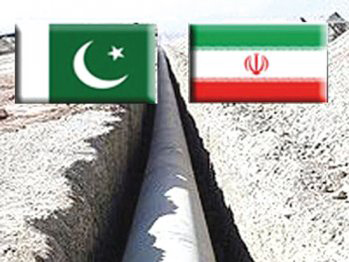Pakistan was committed to the Iran-Pakistan (IP) gas pipeline project but it was still facing sanctions, Petroleum and Natural Resources Minister Shahid Khaqan Abbasi said.
"Dollar transactions have not been allowed and investors are not willing to finance due to the 'snap back' clause, which may lead to imposition of sanctions again on the project," Abbasi said while speaking at a seminar on the "LNG market analysis and trends", Express Tribune reported on May 24.
The IP gas pipeline needed an investment of $2 billion, but investors were hesitant to invest, he said, stressing Pakistan was committed to implementing the project and was working on an alternative plan.
Responding to a question, the minister said some international sanctions were still in place on Iran and in this scenario Pakistan could not build the pipeline. However, Pakistan and Iran are closely collaborating on all the subjects including the IP pipeline and once sanctions are lifted work would start immediately.
He described LNG import as a short, medium and long-term solution to the gas crisis in Pakistan. "LNG will lead to economic growth and reduce the oil import bill," he said, claiming it was cheaper than natural gas supply from the IP and Tapi pipelines.
About the linking of LNG price with crude oil, the minister emphasised that there was no other benchmark available in the world.
Abbasi said Pakistan was currently importing 450 million cubic feet of LNG, which would be increased to 2.4 billion cubic feet per day (bcfd) in the next two years.
At present, gas is being supplied to industries and power plants without any interruption.
The government is also focusing on exploration of domestic gas deposits as production had been hovering around 4bcfd since 2000. However, demand has reached 8bcfd and to bridge the gap LNG import is the only available option.
"Pakistan imports crude oil worth $15 billion per annum, of which furnace oil imports eat up $9 billion," he said. "Replacing furnace oil with LNG will save at least $2 billion per annum as it is the cleanest and most efficient compared to other fuels used in power production."
He expected the private sector to come forward as infrastructure was available to deliver LNG to the consumers.
Iran-Pakistan gas pipeline under shadow of politics
Abbasi declared that Pakistan's energy crisis could not be resolved without injecting more gas into the system. "We hope local as well as international exploration and production companies will explore more reserves in the future."
The minister stressed that Turkmenistan, Afghanistan, Pakistan and India (Tapi) gas pipeline was now becoming a reality but it would take four to five years to come on stream.
Granada Group of Companies Inc consultant Mohsin Siddiqui said gas prices would stay low over the next six to seven years.
"Investors are looking at the possibility of supplying LNG to Pakistan," he said, adding long-term agreements should not be linked with oil as Japan, South Korea and China were concerned about linking their contracts with oil over the long run.
Pakistan GasPort Project Director Rahat Kamal said the government was working on the second LNG terminal, for which his company had been declared the successful bidder.






